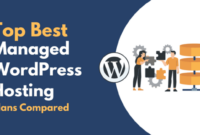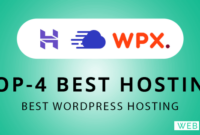Delving into Best cloud hosting for e-commerce, this introduction immerses readers in a unique and compelling narrative, with a focus on defining cloud hosting, its benefits for e-commerce, and key factors to consider when choosing the best provider.
Exploring the top cloud hosting providers tailored for e-commerce businesses and providing a step-by-step guide on setting up an e-commerce website on cloud hosting, this guide is a must-read for anyone in the e-commerce industry.
What is cloud hosting for e-commerce?

Cloud hosting for e-commerce refers to the use of cloud computing resources to host online stores and manage their operations. Unlike traditional hosting, which relies on physical servers located in specific data centers, cloud hosting utilizes virtual servers spread across multiple locations and connected through the internet.
Cloud hosting offers several benefits for e-commerce websites, including scalability, flexibility, and cost-effectiveness. With cloud hosting, e-commerce businesses can easily adjust their server resources based on traffic demands, ensuring optimal performance during peak times. Additionally, cloud hosting providers often offer pay-as-you-go pricing models, allowing businesses to pay only for the resources they use.
One key difference between cloud hosting and traditional hosting for e-commerce is the level of redundancy and reliability. Cloud hosting providers typically have redundant systems in place to ensure high availability and minimize downtime. This is crucial for e-commerce websites, as any downtime can result in lost sales and damage to the business’s reputation.
Scalability and Flexibility
Cloud hosting allows e-commerce businesses to quickly scale their resources up or down based on traffic fluctuations. This flexibility ensures that websites can handle sudden surges in traffic without experiencing slowdowns or crashes.
- Cloud hosting offers auto-scaling capabilities, which automatically adjust server resources based on demand.
- Businesses can easily add more storage, processing power, or bandwidth as needed without the need for manual intervention.
- This scalability is essential for e-commerce websites during peak shopping seasons or promotional events.
Cost-Effectiveness, Best cloud hosting for e-commerce
Cloud hosting can be more cost-effective for e-commerce businesses compared to traditional hosting options. By only paying for the resources used, businesses can save money on infrastructure costs and maintenance.
- Pay-as-you-go pricing models allow businesses to scale resources up or down without incurring additional costs.
- Businesses can avoid upfront investments in physical servers and hardware, reducing the initial capital expenditure.
- Overall, cloud hosting can offer a more predictable cost structure for e-commerce businesses, making it easier to budget and plan for growth.
Factors to consider when choosing the best cloud hosting for e-commerce
When selecting the best cloud hosting for your e-commerce website, there are several crucial factors to consider to ensure optimal performance, security, and reliability.
Scalability Options
- One of the key factors to consider when choosing e-commerce cloud hosting is the scalability options offered by different providers.
- Look for a hosting provider that allows you to easily scale your resources up or down based on your website’s traffic and growth.
- Ensure that the cloud hosting service provides flexibility in terms of CPU, RAM, storage, and bandwidth to accommodate your e-commerce site’s changing needs.
Security Features
- Security is paramount for e-commerce websites, so it’s essential to compare the security features provided by various cloud hosting services.
- Look for hosting providers that offer SSL certificates, DDoS protection, firewalls, regular backups, and other security measures to protect your online store and customers’ sensitive information.
- Consider compliance certifications like PCI DSS for handling payment information securely.
Uptime and Reliability
- Uptime and reliability are crucial for e-commerce websites to ensure that your online store is always accessible to customers.
- Check the uptime guarantees provided by cloud hosting providers and their track record of reliability.
- Look for hosting services with redundant infrastructure, data centers in multiple locations, and 24/7 monitoring to minimize downtime and ensure maximum uptime for your e-commerce site.
Top cloud hosting providers for e-commerce: Best Cloud Hosting For E-commerce

When it comes to choosing the best cloud hosting provider for your e-commerce business, there are several options available in the market. Each provider offers unique features, pricing plans, and customer satisfaction levels. Let’s take a closer look at some of the top cloud hosting providers tailored for e-commerce businesses.
1. Amazon Web Services (AWS)
- AWS is a popular choice for e-commerce businesses due to its scalability and reliability.
- They offer a wide range of services, including Amazon EC2 for hosting websites and applications.
- Pricing plans are flexible, with pay-as-you-go options based on usage.
- Customer reviews praise AWS for its performance and customer support.
2. Google Cloud Platform
- Google Cloud Platform is known for its global network infrastructure and data security.
- They offer services like Google Compute Engine for hosting e-commerce websites.
- Pricing plans are competitive, with discounts for long-term commitments.
- Customers appreciate the ease of use and integration with other Google services.
3. Microsoft Azure
- Azure is a popular choice for e-commerce businesses that use Microsoft products.
- They offer services like Azure Virtual Machines for hosting websites and applications.
- Pricing plans are flexible, with options for businesses of all sizes.
- Customers value the seamless integration with Microsoft tools and services.
Setting up an e-commerce website on cloud hosting

Setting up an e-commerce website on cloud hosting involves a series of steps to ensure a seamless and efficient online shopping experience for your customers. Let’s explore the process in detail.
Step-by-Step Guide
- Choose a reliable cloud hosting provider that offers specific e-commerce features and scalability.
- Register a domain name that resonates with your brand and the products you offer.
- Select an e-commerce platform that integrates well with cloud hosting services, such as Shopify, WooCommerce, or Magento.
- Install the chosen e-commerce platform on your cloud hosting server and configure the necessary settings.
- Customize the design and layout of your online store to create a visually appealing and user-friendly interface.
- Upload product listings, set up payment gateways, and configure shipping options to enable seamless transactions.
- Optimize your e-commerce website for speed, security, and search engine visibility to attract more visitors and drive sales.
- Regularly update and maintain your website to ensure optimal performance and customer satisfaction.
Best Practices for Optimization
- Implement caching mechanisms to reduce load times and improve overall site performance.
- Utilize content delivery networks (CDNs) to distribute website content geographically and enhance loading speeds.
- Secure your e-commerce website with SSL certificates to protect customer data and build trust.
- Monitor website analytics to track user behavior, identify trends, and make data-driven decisions for improvements.
- Optimize images and videos for web display to minimize file sizes and enhance page loading times.
Integration of E-commerce Platforms
- Many e-commerce platforms offer seamless integration with popular cloud hosting providers, allowing for easy setup and management.
- Ensure that the e-commerce platform you choose is compatible with the features and resources provided by your cloud hosting service.
- Integrate payment gateways, inventory management systems, and customer relationship management tools to streamline operations and enhance the shopping experience.
- Regularly update your e-commerce platform and cloud hosting service to leverage new features and security patches for optimal performance.
In conclusion, Best cloud hosting for e-commerce is essential for the success of online businesses, offering scalability, security, and reliability. By choosing the right provider and following best practices, e-commerce websites can thrive in the cloud hosting environment.
When it comes to hosting reviews, one name that stands out is Hostinger hosting review. Known for its affordability and performance, Hostinger is a popular choice among website owners.
Looking for a reliable managed hosting provider? Check out this detailed guide on Managed hosting provider to find the perfect solution for your website needs.
Considering VPS hosting for your website? Learn more about Hostinger VPS hosting pricing and see if it’s the right fit for your online presence.



